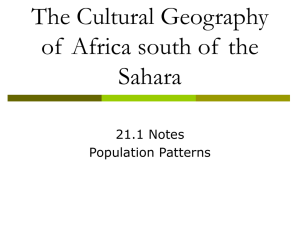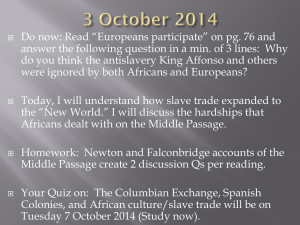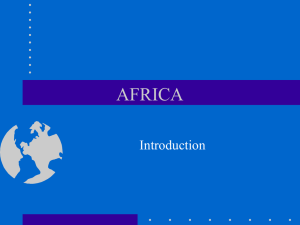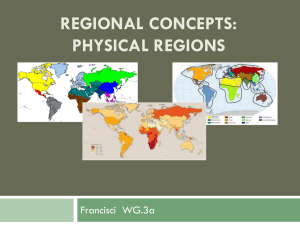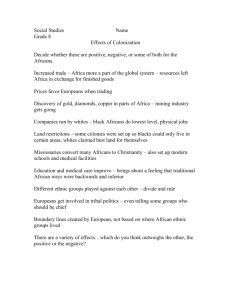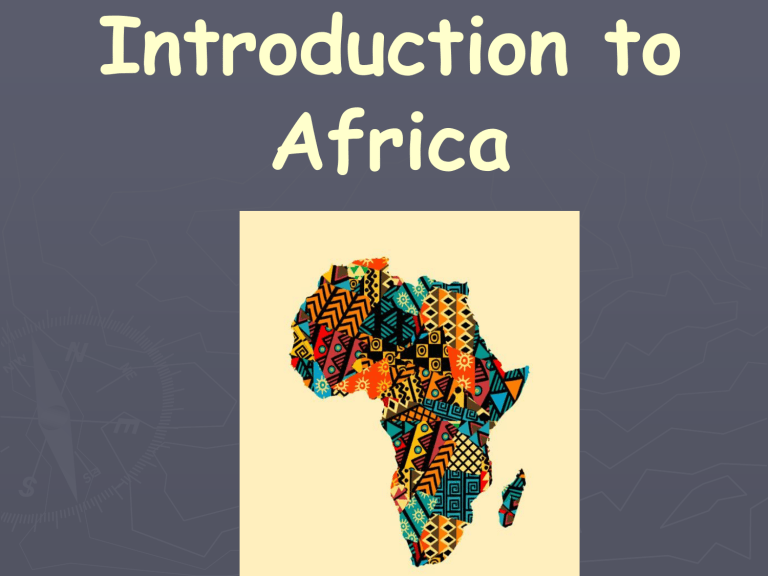
Introduction to Africa ►Africa Did you know? has more countries than any other continent. ►The Sahara is a desert that is the size of the U.S. It’s the world's largest desert. ►Most of the world’s gold and diamonds come from Africa. ►More than 800 languages are spoken in Africa. ► Africa’s Landforms Africa is located between the Atlantic Ocean and the Indian Ocean. It has a long, smooth coast, so it does not have many harbors or ports. This makes it hard for Africans to use the seas for trading. The Sahara, which is Arabic for desert, stretches from the Atlantic Ocean to the Red Sea. It’s the world’s largest desert. Years can pass without rain. The Sahara divides Africa into two regions. * North Africa includes the Sahara and the region south of the Mediterranean. * The rest of Africa is sub-Saharan Africa or Africa below the Sahara. A huge plateau covers most of Africa. (high, flat land) This is the Waterburg Plateau in Namibia. Rivers ►Africa has four large rivers. ►The Nile River in east Africa is the longest river in the world. ►The Niger, Congo and Zambezi are other long African rivers. The region in central Africa near the Equator has a hot, wet tropical climate. ► Hundreds of ethnic groups live together in close groups called tribes. Each ethnic group has its own language, religion, and culture which can sometimes cause conflicts. This map shows where the different tribes in Africa live. Europeans divided most of Africa into colonies. Often different ethnic groups were forced to live together in one country causing conflicts. Liberia (left) and Ethiopia (right) are the only countries that were never colonies. Many of these ethnic groups were enemies and could not get along. Today fighting among ethnic groups is still a problem. ► "We are fighting every day because we are Hutu and they are Tutsis. We cannot mix, we are always in conflict," the tribesman said. "We will stay enemies forever." (left, Hutu soldiers in Rwanda) Raw materials are products from nature such as cotton, metal, and wood. The Europeans used them to make factory goods that they would sell to their African colonies. Europeans also started plantations. A plantation is a large farm that grows cash crops. Plantations in colonial times grew cash crops such as coffee, sugarcane, and cotton. Life Today ► Today most Africans earn a living by farming. ► They use traditional methods like using animals to pull plows instead of modern farm machinery like tractors. Most Africans are farmers, they struggle just to grow enough food for their families. Africans also work in mines and export its minerals to many nations. Each African nation earns most of its money by exporting only one or two farm or mineral products. Today, most countries in Africa are still developing nations. This means that except for the country of South Africa, the nations in Africa have a low standard of living and poor industry or technology. Are all countries in Africa poor? No, this is a stereotype (unfair and untrue belief). South Africa is an example of a developing country in Africa Today, Africans are still working to improve their countries.
